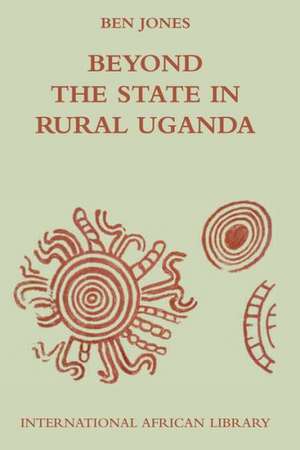Beyond the State in Rural Uganda: International African Library, cartea 39
Autor Ben Jonesen Limba Engleză Paperback – 30 noi 2008
| Toate formatele și edițiile | Preț | Express |
|---|---|---|
| Paperback (1) | 191.38 lei 6-8 săpt. | |
| EDINBURGH UNIVERSITY PRESS – 30 noi 2008 | 191.38 lei 6-8 săpt. | |
| Hardback (1) | 612.70 lei 3-5 săpt. | |
| EDINBURGH UNIVERSITY PRESS – 30 noi 2009 | 612.70 lei 3-5 săpt. |
Preț: 191.38 lei
Preț vechi: 213.98 lei
-11% Nou
Puncte Express: 287
Preț estimativ în valută:
36.63€ • 39.80$ • 30.79£
36.63€ • 39.80$ • 30.79£
Carte tipărită la comandă
Livrare economică 22 aprilie-06 mai
Preluare comenzi: 021 569.72.76
Specificații
ISBN-13: 9780748635191
ISBN-10: 074863519X
Pagini: 199
Ilustrații: 3 maps, 9 black & white illustrations, 6 black & white tables, 1 map, 9 b+w illustrations, 6 b+w tables
Dimensiuni: 152 x 231 x 15 mm
Greutate: 0.34 kg
Editura: EDINBURGH UNIVERSITY PRESS
Seria International African Library
Locul publicării:United Kingdom
ISBN-10: 074863519X
Pagini: 199
Ilustrații: 3 maps, 9 black & white illustrations, 6 black & white tables, 1 map, 9 b+w illustrations, 6 b+w tables
Dimensiuni: 152 x 231 x 15 mm
Greutate: 0.34 kg
Editura: EDINBURGH UNIVERSITY PRESS
Seria International African Library
Locul publicării:United Kingdom
Notă biografică
Ben Jones is a Lecturer in Development Studies at the University of East Anglia. The thesis manuscript, on which the book is based, was awarded the William Robson Memorial Prize by the London School of Economics.
Cuprins
1. Introduction; Moving the State from the Centre; In Between "Development"; The Rest of the Book; 2. Introducing Oledai; Themes that Cut Across Developments in the Village; Seniority, Prosperity, Propriety; Explaining Change in the Village; 3. Teso Society through the Twentieth Century; From Stateless to Sub-Colonial; Teso through the Post-Colonial Period; The Teso Insurgency; Conclusion; 4. The Village Court and the Withdrawn State; Away from Decentralisation; The History of the State in Teso Villages; The Actual Work of the Village Council in Oledai; Conclusion; 5. The Pentecostal Church; The Nature of Pentecostalism; Pentecostalism in the Teso Region; The Incorporation of Pentecostalism; The Limits to Incorporation; Conclusion; 6. The Anglican and Catholic Churches; The Historic Mission Churches in Teso; The Influence of Pentecostalism; Conclusion; 7. Burial Societies; The Work of Burial Societies; The Genealogy of Burial Societies; Burial Societies and Local Borrowings; The Past in the Present; Conclusion; 8. Conclusion; Churches and the Meaning Of Change; Burials, Ideas and Institutional Change; Uganda in Between; Appendix A: Research Methods; Appendix B: Interviews; Interviews Conducted in the Sub-Parish of Oledai; Interviews: Others; Participants in Group Discussions in Oledai; Participants in Group Discussions in Agolitom (Conducted in Ateso).
Recenzii
A very readable book and one that challenges current development discourses with good ethnography and historical scholarship. It is a book that will be particularly useful for teaching in undergraduate courses and in postgraduate seminars! And it is essential reading for students of Uganda, and indeed for students of Africa. -- Michael Whyte African Studies Review A fascinating and convincing book! Yoweri Museveni, so the story goes, has made the hard decisions that would usher in economic, social, and political development, and for that he is feted in Western capitals and is showered with millions in aid. Instead, Jones examines Oledai sub-parish in the Iteso region of eastern Uganda, where the state and NGOs appear more or less irrelevant to daily life, and the achievements for which Museveni is hailed are nowhere to be seen. -- Brett L. Shadle Journal of African History Offers a new anthropological perspective on how to think about processes of social and political change in poorer parts of the world, appealing to anyone interested in African development. Society Now An attractive option for classroom use. ... Advanced undergraduate students in anthropology, history, and development studies would find much to value in this text. Graduate students and specialists will also appreciate Jones' ability to integrate sophisticated theoretical arguments into a compelling ethnohistorical analysis. -- Alicia Decker International Journal of African Historical Studies I consider the book to be a welcome addition to the recent ethnographic literature on East Africa. -- Jan de Wolf Social Anthropology An accessible, intelligent, and stimulating account, and a very welcome addition to a literature on Uganda which frequently does limit itself, as Jones himself argues, to rather reactionary and conventional accounts of developmental 'transformation'. -- Tania Kaiser Journal of the Royal Anthropological Institute A very readable book and one that challenges current development discourses with good ethnography and historical scholarship. It is a book that will be particularly useful for teaching in undergraduate courses and in postgraduate seminars! And it is essential reading for students of Uganda, and indeed for students of Africa. A fascinating and convincing book! Yoweri Museveni, so the story goes, has made the hard decisions that would usher in economic, social, and political development, and for that he is feted in Western capitals and is showered with millions in aid. Instead, Jones examines Oledai sub-parish in the Iteso region of eastern Uganda, where the state and NGOs appear more or less irrelevant to daily life, and the achievements for which Museveni is hailed are nowhere to be seen. Offers a new anthropological perspective on how to think about processes of social and political change in poorer parts of the world, appealing to anyone interested in African development. An attractive option for classroom use. ... Advanced undergraduate students in anthropology, history, and development studies would find much to value in this text. Graduate students and specialists will also appreciate Jones' ability to integrate sophisticated theoretical arguments into a compelling ethnohistorical analysis. I consider the book to be a welcome addition to the recent ethnographic literature on East Africa. An accessible, intelligent, and stimulating account, and a very welcome addition to a literature on Uganda which frequently does limit itself, as Jones himself argues, to rather reactionary and conventional accounts of developmental 'transformation'.


